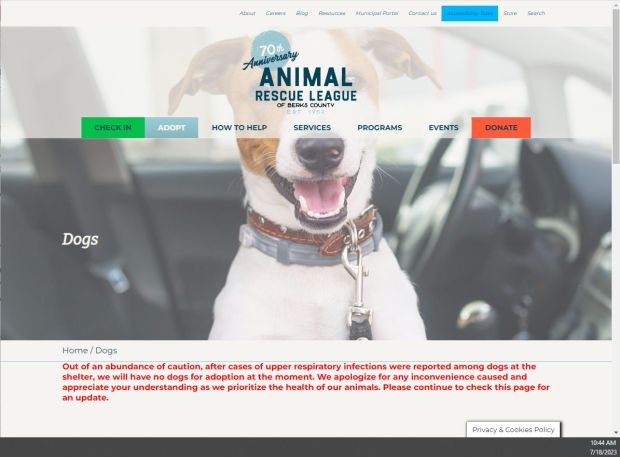Infection
Infectious canine respiratory disease has shut down Animal Rescue League of Berks County dog adoptions
On July 4, the Animal Rescue League of Berks County shut down dog adoptions at its Cumru Township shelter after two dogs showed symptoms of what was thought to be canine influenza, according to José Joel Delgado-Rivera, ARL chief communications officer.
Ultimately, dog flu was ruled out.
Delgado-Rivera shared an email that he said Dr. John Hurst, a veterinarian on staff at the ARL since December, had sent out to fellow staff members on July 13 regarding the first cases, which were seen in dogs named Doggie Parton and Carl Dean. Carl Dean ultimately died:
“From samples collected from Doggie Parton and Carl Dean (antemortem), we were able to determine that canine influenza virus was not present in the submitted samples. From the animals which have become ill following Doggie Parton and Carl Dean, we have seen that their clinical signs and the rate of spread is not consistent with canine influenza virus transmission, and so we now believe with confidence that canine Influenza virus is not actively circulating in our shelter dog population.
“This leaves nine remaining suspects of various levels of suspicion and clinical significance.”
Further complicating matters, Hurst wrote, was the likelihood of multiple simultaneous co-infections.
“Here you may appreciate the difficulty of treating and communicating about Canine Infectious Respiratory Disease (CIRD) complex,” his email said.
Hurst said in the email he could not be certain of the specific organism affecting the ARL’s dogs, noting that there are 10 usual suspected causes of respiratory disease-causing organisms. Only the canine influenza virus was ruled out of the samples collected from Doggie Parton and Carl Dean.
“Regardless of the specific organisms involved, the signs of illness remain consistent. We are seeing primarily upper respiratory disease signs: eye and nasal discharge (clear to cloudy, thin to thick), sneezing, and dry coughing; which in the minority of cases will progress to pneumonia, fever, lethargy, anorexia, difficulty breathing, and a productive cough (patients spit or swallow phlegm after coughing). In rare cases, these more severe signs may lead to death if left untreated/unattended,” Hurst wrote.
As of Tuesday, the ARL still had not resumed dog adoptions, according to its website, www.berksarl.org.
Reading Eagle screen capture
The Animal Rescue League of Berks County, 58 Kennel Road, Cumru Township, halted dog adoptions July 4, 2023, due to an upper respiratory illness outbreak at the kennel. No dog adoptions were being conducted as of July 18. (Reading Eagle screen capture)
An email Monday inquiring when they were expected to resume was not answered.
“Since last year we have been seeing a stall in adoptions,” Delgado-Rivera wrote last week. “Especially dogs and older cats are having longer stays at the shelter, which mixed with the stress caused by living in a kennel surrounded by other animals, smells, noise, etc. make them susceptible to infections and behavioral decline.
“Keeping clean and healthy environments is crucial to keep the animals safe, so we are currently recruiting kennel-cleaning volunteers to help our animal care staff with this. People may apply at https://berksarl.org/volunteer-2/.”
Other rescue groups were asked if they were experiencing any upper respiratory infections in their dogs.
Lakin Harmon-Minnich of Zoe’s House Rescue, a foster-based group in Sinking Spring, said they were not.
“Humane PA has not seen any notable or abnormal incidence of disease or illness at our hospitals or shelters,” said Karel Minor, CEO and president of Humane Pennsylvania, on July 15. “We obviously see sick animals every day at our hospitals and have occasional shelter illnesses. We haven’t noted anything beyond what would be considered typical health conditions.”
Humane PA operates Freedom Center for Animal Life-Saving at 1801 N. 11th St. in Reading; Lancaster Center for Animal Life-Saving at 2195 Lincoln Highway East, Lancaster; and veterinary hospitals in Reading and Lancaster.
Minor also added Humane PA has never had a confirmed case of canine influenza.
“Our health protocols have contagious disease in mind, especially diseases that are more life-threatening illness such as parvovirus,” he wrote. “Our kennel design, HVAC, and intake, health, and response protocols help us to identify and treat emergent illness rapidly and before it has a chance to spread. That may account for our ‘luck’.”
Dr. Alicia Simoneau, chief veterinary officer of Humane Pennsylvania, said in an email that there is a vaccine for canine influenza virus.
“Unfortunately, the vaccine is on backorder from one of the leading manufacturers until autumn,” Simoneau said.

